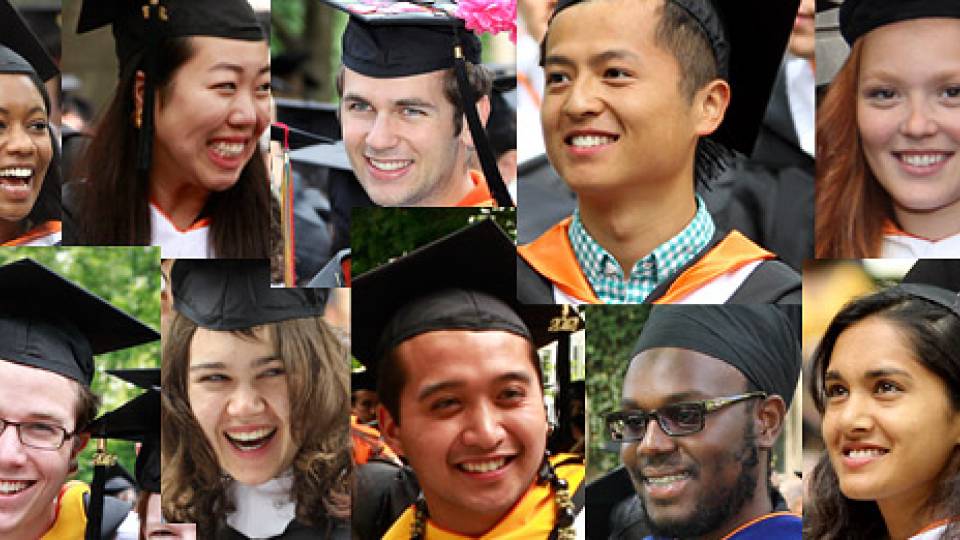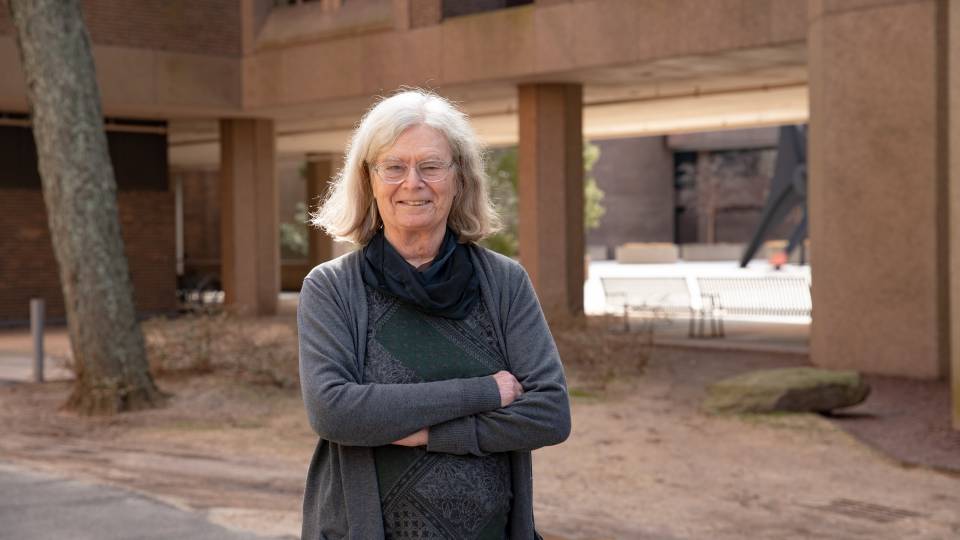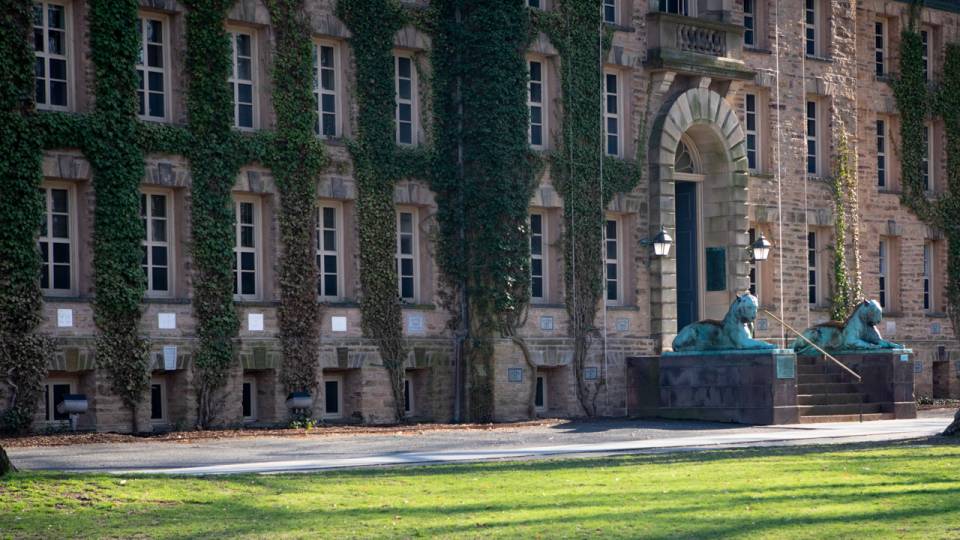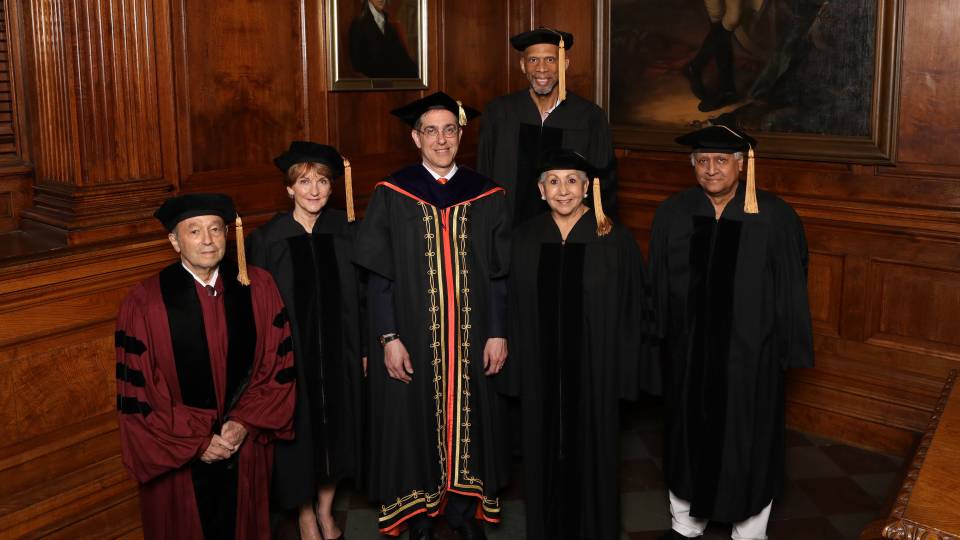Princeton University awarded honorary degrees during Commencement exercises Tuesday, June 5, to six individuals for their contributions to athletics, music, education, the humanities and science.
Princeton President Shirley M. Tilghman awarded degrees to Peter Carril, basketball Hall-of-Famer and former Princeton coach; Aretha Franklin, the singer known as "the Queen of Soul"; Eduardo Padrón, president of Miami Dade College; Joan Wallach Scott, the Harold F. Linder Professor in the School of Social Science at the Institute for Advanced Study; Joseph Taylor Jr., the James McDonnell Distinguished Professor of Physics Emeritus at Princeton; and Karen Uhlenbeck, the Sid W. Richardson Foundation Regents Chair in Mathematics at the University of Texas-Austin.
The following is biographical information on the recipients and the official citations.
Peter Carril, Doctor of Humanities
Hall of Fame college basketball coach Peter "Pete" Carril led the Princeton University men's basketball team for 29 seasons and is known for popularizing a style of play now called "the Princeton offense." After college, the Army and several high school and college coaching positions, Carril came to Princeton in 1967. The teams he coached won 514 games and 13 Ivy League championships, and led the nation in defensive points allowed 14 times. Rather than flashy play, the Princeton offense revolved around the principles of discipline and selflessness, and the strategy of constant motion, passing and cutting.
Carril took Princeton to 11 NCAA tournaments and two National Invitation Tournaments, winning the NIT in 1975. In the first round of the NCAA tournament in 1996, Princeton notched a memorable win by beating the defending champion University of California-Los Angeles team; it was Carril's last victory as the Princeton head coach. At the time that he retired, he was the only Division I coach to earn 500 victories without providing athletic scholarships, which the Ivy League prohibits. Carril then joined the NBA's Sacramento Kings, spending 15 years as an assistant coach and consultant. In 1997, he was inducted into the Naismith Memorial Basketball Hall of Fame. In 2009, the game floor of Princeton's Jadwin Gymnasium was named Carril Court.
More often than not, his players were shorter, slower and less athletically gifted than their opponents, but he turned their limitations into strengths — teaching them that the greatest attributes were intelligence, discipline, selflessness and commitment. His defense was tenacious and his offense was legendary, where movement was paramount, the pass was as important as the shot, and the back door was often the portal to victory. David once again beat Goliath when he coached Princeton to one of the greatest upsets in NCAA history, but his greatest legacy was his teaching. He once wrote, “I think Princeton kept me because some of my players seemed better for the experience.” So is college sport. So are we all.
Aretha Franklin, Doctor of Music
Aretha Franklin, the "Queen of Soul," has a repertoire that spans soul, jazz, rock, blues, pop and gospel. Singing in her father's church marked the beginning of Franklin's musical journey. She recorded her first album at age 18 and has recorded 223 albums in a career spanning more than 50 years. In 1968, she sang at the funeral of Martin Luther King Jr., a close friend of her father. During the civil rights movement, her soul music spoke to a new generation, and her most famous hit, "Respect," a 1967 cover of an Otis Redding track, is considered her greatest triumph and a vocal foreshadowing of the women's movement.
Franklin sang at the inaugural gala for President Jimmy Carter in 1977 and at the 1993 inauguration of President Bill Clinton, who awarded her the 1999 National Medal of Arts. In 2005, she received the Presidential Medal of Freedom from President George W. Bush. She also sang at the inauguration of President Barack Obama in 2009. Franklin's honors include 21 Grammy Awards, with the 1991 Living Legend Grammy and the 1994 Lifetime Achievement Grammy. In 1987, she became the first woman to be inducted into the Rock and Roll Hall of Fame. Franklin earned the United Negro College Fund's Award of Excellence in 2007, and in 2008, Rolling Stone magazine named her No. 1 on its list of "The 100 Greatest Singers of All Time."
The first woman in the Rock and Roll Hall of Fame and the #1 “Greatest Singer of the Rock Era,” she earned her legendary status in American culture as a result of her virtuosic vocals that fundamentally and forever transformed the world of popular music. She pioneered an impeccably bold and fearless, affective and affecting style of performance that calls upon listeners to journey to the depths of her soul and, in so doing, discover their own. With her singular “Amazing Grace,” she continues to traverse musical bridges “over troubled water,” and by reminding us to “think,” “do right” and “call” on her, the Queen of Soul will forever command the world’s R-E-S-P-E-C-T.
Eduardo Padrón, Doctor of Laws
Eduardo Padrón has served since 1995 as the president of Miami Dade College, the largest institution of higher education in America with more than 170,000 students. Padrón, who trained as an economist, is known for his advocacy on behalf of underserved populations in higher education and is often invited to participate in educational policy forums in the United States and abroad. Miami Dade College enrolls and graduates more minorities, including the largest numbers of Hispanics and African Americans, than any other college in the country. Padrón arrived in America in 1961 at age 15, as part of Operation Pedro Pan, a program during the Cuban revolution that brought Cuban children to the United States.
Padrón has been honored with several presidential appointments; most recently, President Barack Obama appointed him in 2010 as chairman of the White House Commission on Educational Excellence for Hispanic Americans and invited Padrón to represent the United States at the 2009 UNESCO World Conference on Higher Education. A member of the Council on Foreign Relations, Padrón has also received numerous honors including the Reginald Wilson Diversity Leadership Award from the American Council on Education and the 2012 Aspen Institute/Ascend Fellowship, awarded to pioneers from diverse fields who pursue new pathways that break the cycle of intergenerational poverty.
He came to this country at age 15, a refugee from Cuba. He began college at the only school that accepted him, and in 1995 he was named its president. Under his leadership, Miami Dade has become not only this country’s largest and one of its most diverse institutions of higher education, but the standard bearer for the transformative role community colleges can play in serving their communities and helping students from all backgrounds fulfill their aspirations. An influential and inspirational advocate for opportunity, access and excellence, he speaks persuasively and persistently not only to his institution but to the entire nation and the world.
Joan Wallach Scott, Doctor of Humane Letters
Joan Wallach Scott is the Harold F. Linder Professor in the School of Social Science at the Institute for Advanced Study in Princeton. She joined the institute as a professor in 1985 after serving as the founding director of the Pembroke Center for Teaching and Research on Women at Brown University. Previously, she taught at three other U.S. universities. Scott is best known for her pioneering work in feminist history and gender theory. Written more than 25 years ago, her classic article, "Gender: A Useful Category of Historical Analysis," continues to inspire research on women and gender. While the geographical focus of her work is France, her work addresses universal issues. Her most recent books include "The Fantasy of Feminist History"; "The Politics of the Veil"; "Parité: Sexual Equality and the Crisis of French Universalism"; and "Only Paradoxes to Offer: French Feminists and the Rights of Man."
Scott is a fellow of the American Academy of Arts and Sciences. Her numerous honors include three from the American Historical Association: the Award for Scholarly Distinction, the Nancy Lyman Roelker Mentorship Award for Graduate Teaching and the Joan Kelly Memorial Prize in Women's History for "Gender and the Politics of History."
A quarter-century ago, she made gender a crucial category for historical scholarship. Understanding gender relations, she showed us, goes beyond studying the status of women. In studies ranging from 19th-century glassworkers of Carmaux to veiled students in current-day Paris, she has illuminated the systems of distinction and legacies of subordination that stand behind the language of equality. By linking the realms of public and private, secular and religious, fantasy and reality, she has extended feminist theory while launching new lines of inquiry in social science, providing new insight into who we are and how we relate to each other.
Joseph Taylor Jr., Doctor of Science
Joseph Taylor Jr. is the James McDonnell Distinguished University Professor of Physics Emeritus at Princeton. He shared the Nobel Prize in physics in 1993 with Russell Hulse for their discovery of a unique twin star system known as a binary pulsar and its use to verify Einstein's general theory of relativity. Taylor joined the Princeton faculty in 1980 and served as dean of the faculty from 1997 to 2002, after which he returned to teaching and transferred to emeritus status in 2006. His career has included faculty positions at the University of Massachusetts and Harvard University. He was a visiting scientist at the Arecibo Observatory in Puerto Rico and at the Australia Telescope National Facility and served as associate director of the Five College Radio Astronomy Observatory in Massachusetts for four years.
Taylor's research continues to explore problems in astrophysics and gravitational physics by means of radio-wavelength studies of pulsars. He is also known for his work in amateur radio, which he started pursuing as a teenager and for which he has written several computer programs. Among his numerous awards, Taylor has received the Dannie Heineman Prize for Astrophysics, a MacArthur Fellowship, the Albert Einstein Medal and the Wolf Prize in Physics. He is a member of the National Academy of Sciences and the American Philosophical Society, and is a fellow of the American Academy of Arts and Sciences and the American Physical Society.
A boyhood fascination with radios led him to scan the skies for signals from across the galaxy. He and his students were rewarded with radio pulses from a pair of spinning bodies whose slightly diminishing dance told a story of the deepest laws of the universe. The world has been rewarded with decades of insights that flowed from that encounter, including confirmation of Einstein's theory of relativity. As a professor and as dean of the faculty, his firm but gentle drive for the highest-quality work advanced his field and this University, bolstering the ranks of students who were inspired by his curiosity and colleagues who shared his passion for seeking and transmitting knowledge.
Karen Uhlenbeck, Doctor of Science
Karen Uhlenbeck has used her renown in mathematics to encourage and mentor younger generations of mathematicians, particularly women. Uhlenbeck flourished as a student, but was attuned to the discouraging attitude toward women in mathematics and science. After receiving her doctorate, she held faculty positions at the University of Illinois-Urbana-Champaign, the University of Illinois-Chicago, the University of Chicago and the University of Texas-Austin, where since 1987 she has served as a professor and the Sid W. Richardson Foundation Regents Chair in Mathematics. Uhlenbeck became recognized for her work in mathematical physics and partial differential equations, particularly gauge theory and global analysis.
Uhlenbeck has received numerous honors, including the National Medal of Science in 2000, for her work as a researcher and educator. In 2007, her colleagues in the American Mathematical Society honored her work in gauge theory with the Leroy P. Steele Prize for published work of lasting and fundamental importance. As a teacher and mentor, Uhlenbeck co-founded, with the Institute for Advanced Study in Princeton, the IAS/Park City Mathematics Program, which provides intensive instruction for students and educators at the secondary and postsecondary levels. In addition, she co-founded the IAS/Princeton University Program for Women and Mathematics, a summer study program for women at the undergraduate and advanced levels.
A mathematician with a self-avowed "addiction to intellectual excitement," she made foundational contributions to mathematical physics and partial differential equations. Her seminal work on large gauge theory has fundamentally influenced the field of particle dynamics. Her 40-plus years of research and teaching have fundamentally influenced the lives of countless young mathematicians. The programs she founded take students and educators on an inspiring journey deep into the wonders of mathematics, encouraging more young people, and especially women, to enter — and stay — in the field, and providing them with an environment that fosters their own "addiction to intellectual excitement."





